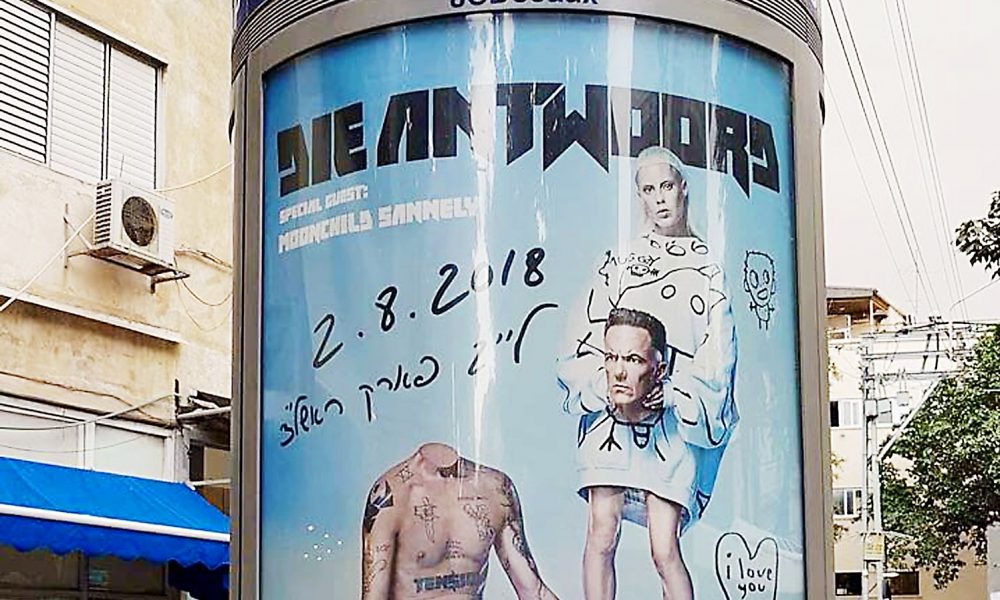News
Die Antwoord to play in Israel despite calls for boycott
South African music duo Die Antwoord announced last Monday that they will perform a concert in Rishon LeZion in August, at the same venue where they performed in 2016.

Tali Feinberg
The announcement comes soon after the ANC called for a cultural boycott of Israel, after expressing disappointment at the recent performance in Israel by DJ Nkosinathi Maphumulo, popularly known as Black Coffee.
“We call on all artists to have an appreciation of the role played by the international anti-apartheid solidarity movement in the successful international isolation of apartheid South Africa,” said Lindiwe Zulu, the chairperson of the ANC’s international relations committee, after Black Coffee’s performance.
“The people of Palestine are in a just cause for self-determination and we urge our artists not to form part of the normalisation of Israel’s suppression of the Palestinian people in their quest for self-determination and statehood that mirrors our very own struggle.
“The South African artistic community, having themselves experienced discrimination and oppression, must therefore continue to pledge solidarity with others who are oppressed,” added Zulu.
In response, Black Coffee tweeted: “Like everyone else I have rights and free will and no, Black Coffee is not a political party… I work as an entertainer to feed my family. To sum it up… I’ll take a bullet for my family.”
The media in general and people on Twitter expressed anger at Die Antwoord’s upcoming performance. Sabelo Mkhabela of the website OkayAfrica wrote: “For Die Antwoord to go ahead and perform in Israel is insensitive. Not that it’s unexpected from a crew that has thrived off of appropriation of Cape Coloured culture and has been defensive when called out.”
And on Twitter, one user wrote: “I hope the ANC govt will have balls of steel to confront this White Coffees like they did with Black Coffee.” Another wrote: “@DieAntwoord will go perform in Apartheid Israel for the second time in two years. Both of them are old enough to know what apartheid was like in South Africa.”
Yet the performers seem unperturbed. During their 2016 concert, band member Ninja said in colourful language that he did not care what the rest of the world thought – he was there to perform music for Israelis and is an “African brother” to Israelis.
Jason Borland, who made aliyah from Cape Town two years ago, says: “Let’s be honest here, no Israeli actually understands what Die Antwoord are saying in their songs.” However, he thinks Israelis like their music because “they are curious about the ‘gangsta’ image they put out and the tone and key of band members Ninja and Yolandi’s voices”.
He is a huge fan. “I have been a fan of Ninja’s work from when he was still rocking as ‘Maxnormal.tv’ with The Real Estate Agents, which to this day is some of the greatest underground hip hop to come out of South Africa,” says Borland.
“I was extremely lucky enough to meet and hang with Ninja a few years back. He explained what his vision is and where he sees his group going in the future. He is extremely hard-working and it’s great that they are focusing on touring the world instead of trying to fill Orlando Stadium.”
He adds that Black Coffee has a huge following in Israel and is also headlining festivals there every year. “In my opinion, he is bigger here than Die Antwoord!”
Borland concludes: “As a fellow South African musician, I am very proud of how Die Antwoord has put our music scene on the world map and I will continue to support them and will definitely be at their upcoming concert waving my SA flag high!”
Israeli Omri Liav adds that while he is a fan, a lot of his friends have not heard of Die Antwoord. “For the Israelis who do know and like them, I can assume it’s because of their ‘Zef’ culture, their passion to create and behaving the way their values dictate. For example, when Ninja told the crowd at their 2016 concert ‘F**k the boycott’, it wasn’t because of their Zionism, it was because of Die Antwoord’s non-conformism.”